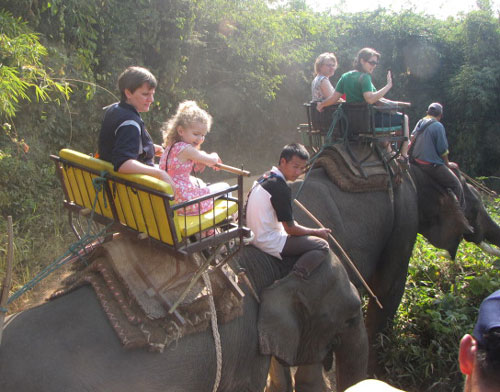06 Feb Thailand Part 3: At the Elephant Farm

On January 20-24, a Global Ministries Staff Summit was held in Chiang Rai, Thailand. Attending were 28 persons, most of them Global Ministries staff serving in various countries. Jeff Bleijerveld, director of Global Ministries, and associate director Donna Hollopeter sat down a few days after returning to talk about the event. Previously, we published their comments about the sessions they had together and their experience worshiping with the Thai churches on January 20. In this final installment, Jeff and Donna tell about the outing on the last day.
Donna: Our last day together, we took a sampan–a long narrow canoe with a huge motor on back–up the river to an elephant farm, where there were many, many elephants. We all rode elephants for an hour—up the hillside, down the hillside, into the river. For a little bit of money, 20 baht, you could buy a bag of food—green bananas and sugar cane—to feed your elephant.
Two people rode at a time. They would bring the elephant to a tower, and you would climb onto a two-seater bench. And off you’d go, with a Thai man riding on the neck of the elephant. The route included going into the river. Then you went onto the bank to another tower, where you got off the elephant.
Even with the Thai rider and a set route, the elephants all seemed to follow their own mind about what they would do. Any time they came near foliage, they came to a total stop to break off big chunks of plants and snarf it down. We were supposed to be following this path, but four elephants decided to cut across a field instead. The riders kept saying something to the elephants to get them back on track. Then there were some that, instead of going partway into the river, decided they wanted to cross the river to get something to eat on the other side.
Jeff: If you think it’s difficult matching yourself to the rhythm of a horse, you should try riding on an elephant. It’s a total core workout. You can’t match its movements. There is no going with the flow.
Donna: After that, they escorted us to a village where they had huge snakes—pythons and boas. You could have a photo taken with a snake wrapped around you, but the only person who did that was Camden Dice. He had a big yellow boa constrictor, probably 14 feet long, wrapped around him. While photos were being taken, he stood there trying to look enthused, and saying, “Why did I do this?”
After that, we did some shopping with some of the village vendors, and got back to the resort, had lunch, and then took off again for the Golden Triangle area.
At the Opium Museum
Jeff: We went through the House of Opium, a museum which tells the story of the opium trade and how it impacted not only Thailand but much of Asia during colonial times.
Donna: There was a lot of reading, along with videos. There were amazing facts about how even the CIA and the British East India Company were involved in the opium trade.
Jeff: It helped us understand why missionaries who entered China with opium traders were called White Devils. For a Westerner, there were may humbling moments.
The museum is located on the Mekong River at the conjunction of three countries–Thailand, Myanmar, and Laos. The Thai royal family personally paid to develop the museum, which is truly world class.
Donna: Thailand used to be an absolute monarchy, but now it’s a constitutional monarchy. Their king is 85 years old, and the queen is 80. They are dearly loved, even revered. He has been on the throne for 60-some years. Both of them are in ill health. They no longer live in the palace, but have taken over a floor of a hospital in Bangkok.
Jeff: As soon as you arrive in the country, you begin noticing photos of the King of Thailand. The Thai people think very highly of the royal family. As an outsider, if you make a comment perceived as negative to the government, it is not appreciated.
Donna: One of their largest celebrations each year is on the birthday of the King, December 5. All industry closes down, and they have an official day of celebration.

No Comments